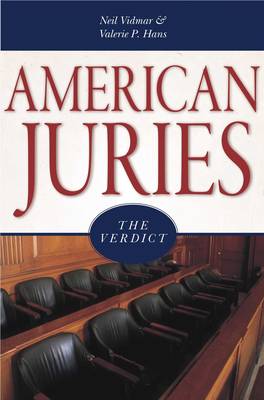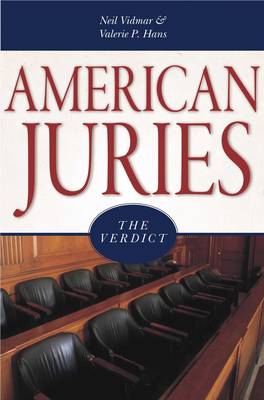
Bedankt voor het vertrouwen het afgelopen jaar! Om jou te bedanken bieden we GRATIS verzending (in België) aan op alles gedurende de hele maand januari.
- Afhalen na 1 uur in een winkel met voorraad
- In januari gratis thuislevering in België
- Ruim aanbod met 7 miljoen producten
Bedankt voor het vertrouwen het afgelopen jaar! Om jou te bedanken bieden we GRATIS verzending (in België) aan op alles gedurende de hele maand januari.
- Afhalen na 1 uur in een winkel met voorraad
- In januari gratis thuislevering in België
- Ruim aanbod met 7 miljoen producten
Zoeken
Omschrijving
Although the right to trial by jury is enshrined in the U.S. Constitution, in recent years both criminal and civil juries have been criticized as incompetent, biased, and irresponsible. For example, the O.J. Simpson criminal jury's verdict produced a racial divide in opinions about that trial. And many Americans still hold strong views about the jury that awarded millions of dollars to a woman who spilled a cup of McDonald's coffee on herself. It's said that there are "judicial hellholes" where local juries provide "jackpot justice" in medical malpractice and product liability cases with corporate defendants. Are these claims valid?This monumental and comprehensive volume reviews over fifty years of empirical research on civil and criminal juries and returns a verdict that strongly supports the jury system. Rather than relying on anecdotes, Vidmar and Hans-renowned scholars of the jury system-place the jury system in its historical and contemporary context, giving the stories behind important trials while providing fact-based answers to critical questions. How do juries make decisions and how do their verdicts compare to those of trial judges and technical experts? What roles do jury consultants play in influencing trial outcomes? Can juries understand complex expert testimony? Under which circumstances do capital juries decide to sentence a defendant to die? Are juries biased against doctors and big business? Should juries be allowed to give punitive damages? How do juries respond to the insanity defense? Do jurors ignore the law? Finally, the authors consider various suggestions for improving the way that juries are asked to carry out their duties. After briefly comparing the American jury to its counterparts in other nations, they conclude that our jury system, despite occasional problems, is, on balance, fair and democratic, and should remain an indispensable component of the judicial process for the foreseeable future.
Specificaties
Betrokkenen
- Auteur(s):
- Uitgeverij:
Inhoud
- Aantal bladzijden:
- 428
- Taal:
- Engels
Eigenschappen
- Productcode (EAN):
- 9781591025887
- Verschijningsdatum:
- 1/02/2008
- Uitvoering:
- Hardcover
- Formaat:
- Ongenaaid / garenloos gebonden
- Afmetingen:
- 163 mm x 229 mm
- Gewicht:
- 703 g

Alleen bij Standaard Boekhandel
+ 106 punten op je klantenkaart van Standaard Boekhandel
Beoordelingen
We publiceren alleen reviews die voldoen aan de voorwaarden voor reviews. Bekijk onze voorwaarden voor reviews.









